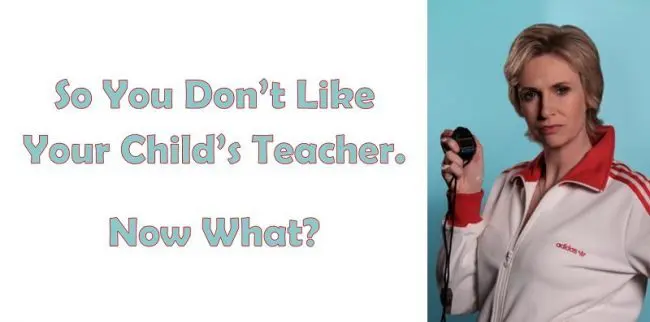Whew! You—and your kids—have made it through the first few days of school. Yay! It’s all good from here, right? Yeeeeah. About that… By now, you’ve had the teacher meet-and-greet and your child has some class time under their belt, so you’re aware of how the teacher operates day-to-day. Plenty of time for you to determine whether or not you like them. And you don’t. So now what?
First, take a minute to check yourself. Why don’t you like your child’s teacher? Is it a plain old personality clash? That is, they’re not doing anything that will negatively affect your child, you just don’t like them. If that’s the case, I’m going to say “Welcome to adulthood.” We all have to interact with people we don’t especially care for, sometimes even for the long haul. This is one of those times. Be aware of how you’re talking about the teacher in front of your child and be sure that you are respectful and positive. After all, like them or not, a respectful classroom environment is important for learning; you help set the tone for how your child treats and interacts with their teacher. And God forbid you say something snarky that Junior repeats to Mr. Smith. Basically, if the situation doesn’t warrant a meeting with the teacher to hash everything out, you shouldn’t be talking about it to anyone else.
Okay. Let’s say you can pinpoint an actual reason you don’t like your child’s teacher. Maybe you disagree with their discipline style, or you have different educational philosophies. (Like homework in kindergarten, which is what I’m dealing with right now. I keep trying to remind myself that’s not necessarily a teacher policy, but a school or district thing. Still. Ugh.) Your best bet is to ask for a meeting with the teacher so you can talk about your concerns. A meeting is best, but a phone call will work in a pinch. Avoid laying everything out in an email, since it’s so easy for misunderstandings to happen when you can see or hear the person you’re talking to. Feel free to create a list of talking points for the meeting, though!
An important note. If the reason you don’t like your child’s teacher is because your child says the teacher doesn’t like them (or was mean, etc.) try to reign in that protective parent instinct for a minute and do some fact finding. Most of us—especially those of us with younger children—know full well that our children are not necessarily the, um, most accurate reporters of facts. It’s not so much that they’re lying as it is that they may be mixing up fantasy and reality, conflating two different stories, or even repeating something they read, watched, or heard from someone else. Remember the “Things Your Child’s Teacher Wants You to Know” meme that starts floating around during the end of summer: “If you promise not to believe everything your child says about me at home, I promise not to believe everything your child says about you in school.” Try to give the teacher the benefit of the doubt. When you meet with them, avoid accusations and use generic language like “Ishmael came home from school very upset on Tuesday. Can you tell me what went on in the classroom that day?” Be more direct if you need to, of course, but starting out with “Elphie said you were mean to her and yelled at her today” is likely to put the teacher on the defensive.
When the meeting doesn’t get the result you want, or you feel the need to do a little bit more fact-finding, most schools will let you make arrangements to observe your child’s classroom. If you’re able to volunteer in the classroom, this is another way to observe less formally. Observation can be especially helpful if your child is reporting a conflict with the teacher, as it can assist you in determining whether that’s just how the teacher interacts with everyone. Not necessarily a good thing, but probably not as bad as an adult singling out your child to be mean to them. On the flip side, if your little angel is actually a demon in school, you’ll get to see that for yourself, too. Always remember that poor behavior in school can be a symptom of so many things, from vision problems to learning disabilities. (PS, if you’re available to volunteer on a regular basis, spending time in the classroom can help you build a relationship with the teacher. That can go a long way towards improving the situation.)
If observation and meeting with the teacher aren’t making you more comfortable (or resulting in change, if that would be appropriate) then it’s time to contact the principal. It’s respectful and polite to reach out to the teacher first, but perfectly appropriate to go up the chain when necessary. And it probably goes without saying, but if the situation your child is reporting involves inappropriate action like physical discipline or potential abuse, the principal or other appropriate authority should be your first call. When you meet with the principal, your goals are the same as they were when you met with the teacher. Try to stay calm, even though by this point, you’re probably frustrated and tired of repeating yourself. Report on the initial issue, the conversations you’ve had with the teacher, any observation you’ve done, and the outcome of your attempts to resolve your concerns. If you’re concerned about confidentiality, confirm your school/district’s policy about parent meetings with administrators. Also, consider partnering the principal in as a mediator and ask for the teacher to be included in a meeting.
Hopefully, at this point you’ll have a resolution that you and your child (and the teacher) are comfortable with. If not, you may need to consider a request for your child to switch classes, or even schools depending on the situation. While not ideal, this step may be necessary to ensure your child’s emotional/mental well-being, their current learning and how they feel about school in the future, and the classroom environment and the effects of a broken relationship between teacher and student on the other children in the classroom.
If you find yourself in this situation this school year, I wish the best of luck. If you’ve had any experience with teacher trouble, share your wisdom in the comments and let us know how you handled things.

